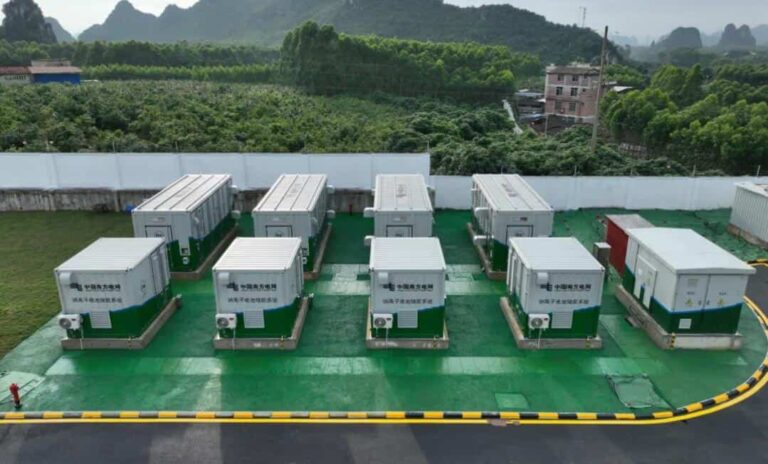This weekly series brings you the most interesting innovation news from around the world, including the latest innovation news, important investments, and inspiring stories. Every week we dig deep into the most promising startups, research, and technology trends.
1. World’s largest sodium-ion battery begins operation
China’s state-owned Datang Group announced that it has connected a 100MWh sodium-ion battery to the power grid, making it the world’s largest operational battery. Located in Qianjiang, Hubei province, the battery storage marks a new stage in the commercialization of sodium-ion battery storage systems. The project is the first phase of a larger 200MWh installation.
HIna Batteries, a supplier of sodium-ion batteries, said the batteries could meet the daily needs of 12,000 households and reduce CO2 emissions by 13,000 tonnes per year. Project manager Cui Yongle said sodium-ion batteries have better operating efficiency in low temperatures.
2. American Airlines Invests in Hydrogen-Electric Engines
American Airlines (AA) is further strengthening its commitment to hydrogen-fueled flight. In fact, earlier this week, AA announced that it would purchase 100 more ZeroAvia hydrogen-fueled aircraft engines to power its regional jets. The airline also increased its investment in ZeroAvia, participating in its Series C funding round.
ZeroAvia is working on developing fuel cell-powered hydrogen-electric engines for commercial aircraft — it’s currently testing a prototype 20-seat plane — and also designs engines for larger planes like the Bombardier CRJ700 that American Airlines uses on some regional routes.
Electrifly to launch electric flights between Maastricht, Aachen and Liège this summer
For two months, Maastricht Aachen Airport (MAA), one of the three Euroregional airports, will host the first electric public flights between the Netherlands, Belgium and Germany. To this end, the airport is working with Aachen Airport, Liège Airport, FH Aachen, ASL Group and NIO on this ambitious cross-border project.
3. Funding a new generation of AI benchmarks
Antropic, the developer of the generative AI model “Claude,” is launching a program to fund the development of new benchmarks to evaluate the impact and performance of AI models, including its own. The program will provide funding to third-party organizations that can effectively measure AI capabilities. “Our investments in these evaluations are intended to advance the overall field of AI safety and provide valuable tools that benefit the entire ecosystem,” the company wrote in a blog post on its website.
AI systems currently lack an efficient benchmarking system. According to TechCrunch, current benchmarks do not effectively capture how people use the systems, and there are doubts that gen-AI benchmarks are accurately measuring the parameters they should be measuring. Therefore, Anthropic calls for high-level, challenging benchmarks that focus on the security and societal impact of AI to continue developing and deploying models responsibly.
4. From the Green Deal to the Green Growth Deal
The European People’s Party (EPP) won a majority in the European Parliament and secured Ursula on der Leyen a second term as European Commission President. As the party works to build a majority, it is already working on its priorities for the new term. In a draft document of its priorities for the new term seen by Euraactive, the party plans to continue but scale back its efforts in tackling climate change and nature protection.
The five-point plan restates the EU’s commitment to transitioning away from fossil fuels and towards clean energy, with current decarbonisation targets for 2030 and 2050. But the plan text also highlights the economic competitiveness and energy security dimensions of the green transition, proposing to “continue to deliver on the Green Deal and transform it into a Green Growth Deal”.
Furthermore, while emphasizing the principle of technology neutrality, the draft also mentions initiatives such as expanding hydrogen production, an alliance on small modular nuclear reactors and investments in carbon capture. The EPP also expresses its intention to amend the ban on combustion engines.
Liberals and Greens suffer major defeat in European elections
Although only 8 of the 27 European countries have finished counting, some important trends are already emerging. The Christian Democrats and the Far Right are the winners of the European elections, while the Liberal and Green parties have suffered heavy defeats. This is clear from the preliminary results of the European elections. Despite the changes, the Christian Democrats, Social Democrats and Liberal Parties maintain their majorities.
5. In the first half of 2024, renewable energies will generate around 60% of Spain’s electricity.
As for the green transition, according to figures from Spanish grid operator Ledeia, nearly 60% of electricity generated in Spain comes from renewable sources, up from 51% last year. Specifically, wind power plants account for 24.4% of total electricity generation, solar power plants 16.3% and hydroelectric dams 15.9%. Spain plans to produce 80% of its energy from renewable sources by the end of the decade, with nuclear power accounting for 18.6% of the country’s total electricity generation, and produced almost 80% carbon-free electricity in the first six months of the year.


